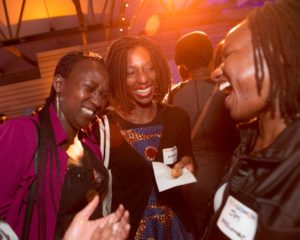Guest post by Siphathisiwe Sibanda, 2015 fellow of Zimbabwe
“A journey of a thousand miles starts with a single step.”- Lao-tzu

Capping off five weeks of learning with a certificate of completion presented by Sheila Casey of the U.S. State Department.
This journey started with a random message from my good friend with a link to the TechWomen website. She said she thought it sounded like something I would be interested in. Six months later, I was setting up my ‘Out of Office’ response at work before rushing home in a frenzy to pack for my flight to San Francisco the next day.
I left Durban for the TechWomen program with a lot of excitement but uncertainty, looking forward to learning new things but petrified of being in a new place with people I have never met before.
I spent five weeks learning from the most diverse people – intellectually, racially and culturally –that I left the program feeling I had traveled the world. The list of companies I had the pleasure to visit and learn from reads like a Fortune 500 list – Google, Facebook, Mozilla, Prospect Silicon Valley and LinkedIn.
Many of my fellow TechWomen will share the technical knowledge they gained from the program, learnings from mentorship and thoughts on being an entrepreneur or starting a business. I shared in those learnings, as well, but for this post, I would like to share my philosophical learnings.
Impossible is nothing.
Befriending so many women, I heard of how much adversity and challenges they have had to overcome to be where they are now. These are the most enduring women I have ever met. They are the embodiment of nothing being impossible. It is hard enough being a woman. Being a woman in STEM is a whole other level of difficulty, but spending time with these #IronSisters showed how there is nothing that you can’t achieve if you put your mind to it.

New friends Anatole Gahongayire of Rwanda, Siphathisiwe Sibanda of Zimbabwe and Joy Makumbe of Zimbabwe.
It really does take a village.
Madeline Albright once said, “There’s a special place in hell reserved for women who don’t help each other.” I believe that there’s a special place in history for women who do. TechWomen helped launch the #IronSisters campaign to help women push through that glass ceiling that prevents women from getting into STEM. We are never going to get anywhere if we do not help and uplift each other. We live in a man’s world, and until we unite, we will never take our place in the world as the innovators, leaders and nurturers that ensure that our children get to enjoy this world and all the great things it has to offer.

Learning about solar with SunEdison mentees, from left, Siphathisiwe Sibanda, Chantal Iribagiza, Eman Abusaada and Diana Tsoy.
Only Africa can solve Africa’s problems.
I have been guilty of accusing everyone of not doing more for Africa. I went to my host company, SunEdison, with the mission of finding out why they were not bringing solar to Africa when it was quite clear that we needed it more than any other continent. It is in my time there that I realized that it is only us Africans who can solve our problems. We best understand the issues we face. We must learn as much as we can from the market leaders in technology, but it is up to us to engineer sustainable and workable solutions for the challenges we face in the Mother Land.
Looking back now, in participating in the TechWomen program, I have been given the burden of passing forward what has been afforded to me to the women in my community and country. It is a burden I am more than happy to carry because I believe in a brighter future for all in STEM, which, with the nurturing of the feminine touch, will go a long way into making our future bright.
Thank you once again to the TechWomen/IIE, mentors, host companies and the State Department for the amazing journey.
About the author
 Siphathisiwe Sibanda relocated to Johannesburg, South Africa, in January 2016 to start a new position as a process engineer with Unilever. She was recruited as a graduate of the Unilever Future Leaders Program (UFLP). The program is an accelerated three-year development program designed to grow participants into managers through hands-on learning alongside world-class experts. She was a project engineer in her third rotation of the program and is part of a $40-million expansion project at one of the biggest savory plants in South Africa. Her other rotations in the program have included demand planning and customer development. She has been involved in sustainable projects within Unilever, as well. Siphathisiwe graduated from the University of KwaZulu Natal in 2011 with a bachelor’s degree in chemical engineering. She has a passion for promoting technical careers for women in Africa and is actively involved in encouraging girls around her community to follow such careers.
Siphathisiwe Sibanda relocated to Johannesburg, South Africa, in January 2016 to start a new position as a process engineer with Unilever. She was recruited as a graduate of the Unilever Future Leaders Program (UFLP). The program is an accelerated three-year development program designed to grow participants into managers through hands-on learning alongside world-class experts. She was a project engineer in her third rotation of the program and is part of a $40-million expansion project at one of the biggest savory plants in South Africa. Her other rotations in the program have included demand planning and customer development. She has been involved in sustainable projects within Unilever, as well. Siphathisiwe graduated from the University of KwaZulu Natal in 2011 with a bachelor’s degree in chemical engineering. She has a passion for promoting technical careers for women in Africa and is actively involved in encouraging girls around her community to follow such careers.


Speak Your Mind